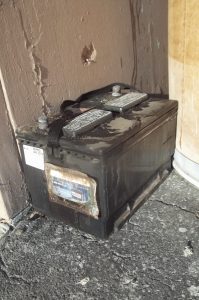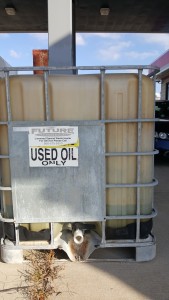The following information is derived from a document entitled: Summary of Illinois’ Solid Waste Legislation – dated April 18, 2013. Be sure to check for updates!
Illinois does not have an omnibus law that deals with solid waste management issues; many separate pieces of legislation focus on waste reduction and recycling. The three major laws that impact and guide the programs and functions of the Division of Recycling and Waste Reduction, Illinois Energy Office, Illinois Department of Commerce and Economic Opportunity’s (DCEO) are the following:
- Illinois Solid Waste Management Act
- Illinois Solid Waste Planning and Recycling Act
- Illinois Environmental Protection Act (EPAct)
Contact me with any questions you may have about the generation, identification, management, and disposal of hazardous waste Daniels Training Services, Inc. 815.821.1550 |
The EPAct contains Illinois’ environmental regulations including provisions that prohibit a variety of items from being disposed of in Illinois’ landfills.
The following items are banned from Illinois’ landfills:
- Yardwaste: Public Act 85-1430 banned landscape waste (grass, leaves and brush) from being landfilled effective July 1, 1990.
- Lead-Acid Batteries (Car Batteries): Public Act 86-723 banned the landfilling of lead-acid batteries effective September 1, 1990.

- Waste Tires: Public Act 86-452 (1989) banned whole used or waste tires from sanitary landfills effective July 1, 1994. (Pubic Act 93-839 eliminated DCEO’s share of the Used Tire Management.)
- White Goods: Public Act 87-858 banned white goods (large appliances) from being landfilled effective July 1, 1994, unless the “white good components have been removed.” White goods include “all discarded refrigerators, ranges, water heaters, freezers, air conditioners, humidifiers and other similar domestic and commercial large appliance.” White good components include: “any chlorofluorocarbons refrigerant gas; any electrical switch containing mercury; and any device that contains or may contain PCBs in a closed system, such as a dielectric fluid for a capacitor, ballast or other component.” Additionally, landfills cannot accept “clean” white goods for disposal unless they participate in the Industrial Materials Exchange Service by communicating the availability of white goods.
 Used Oil: Public Act 87-1213 prohibited, beginning July 1, 1996, persons from knowingly mixing liquid used oil with any municipal waste that is intended for collection and disposal at a landfill. The law further stipulates that no owner or operator of a sanitary landfill shall accept liquid used oil for final disposal beginning July 1, 1996. For the purpose of this act “liquid used oil” shall not include used oil filters, rags, absorbent material used to collect spilled oil, or empty containers which previously contained virgin oil, re-refined oil or used oil.
Used Oil: Public Act 87-1213 prohibited, beginning July 1, 1996, persons from knowingly mixing liquid used oil with any municipal waste that is intended for collection and disposal at a landfill. The law further stipulates that no owner or operator of a sanitary landfill shall accept liquid used oil for final disposal beginning July 1, 1996. For the purpose of this act “liquid used oil” shall not include used oil filters, rags, absorbent material used to collect spilled oil, or empty containers which previously contained virgin oil, re-refined oil or used oil.- Electronic Products: While not covered by the EPA Act, the Electronic Products Recycling and Reuse Act (415 ILCS 150/1 et seq.) bans many electronic products from being landfilled, This more recent law, signed and effective September 17, 2008 as amended in 2011, advances a producer responsibility model for dealing with end-of-life electronics generated in Illinois. Among other things, this legislation bans covered electronic devices from being landfilled in Illinois starting January 1, 2012. Covered electronic devices include computers, monitors, televisions and printers.
Mercury Thermostat Collection Act (415 ILCS 98/1 et seq.) This law includes a prohibition on the disposal of out-of-service mercury-switch thermostats in a sanitary landfill, in addition to prohibiting the mixing of out-of-service mercury-switch thermostats with any other solid waste that is intended for disposal at a sanitary landfill (Section 50). This provision is similar to the landfill bans that apply to car batteries, waste tires and other end-of-life products. This law also contains product stewardship provisions, similar to the Electronic Products Recycling and Reuse
Act. The key provisions include:
- Requires heating, ventilation and cooling (HVAC) contractors or service technicians to recycle mercury switch thermostats that are taken out of service, beginning July 1, 2011.
- Requires thermostat wholesalers (typically heating, plumbing and electrical supply businesses) to act as a collection point for out-of-service mercury thermostats, beginning July 1, 2011. Thermostat wholesalers not participating in the program are prohibited from selling or distributing thermostats.
- Requires thermostat manufacturers to make collection containers available to all thermostat wholesalers and qualified HVAC contractors. Retailers and qualified local government authorities may also request a collection container. Requires thermostat manufacturers to pay for the transportation of the collected mercury-switch thermostats to an appropriate recycling facility.
- Requires thermostat manufacturers to develop and distribute educational materials to help make wholesalers and HVAC contractors aware of the requirements of the law.
- Establishes goals for the collection of mercury-switch thermostats in the first four years of the program. Provides IEPA with authority for setting the collection goals for 2015 to 2020, and requires updates to the collection programs if the goals are not achieved. The law sunsets on January 1, 2021.
Both homeowners and businesses in Illinois need to be aware of the regulations banning certain wastes from landfill disposal. It is the additional responsibility of businesses – and government agencies – to comply with the state and Federal regulations for the ‘cradle-to-grave’ management of the waste it generates on-site. Keeping certain wastes out of the landfills is only one part of a waste generator’s responsibilities.
Daniels Training Services, Inc. 815.821.1550 |


